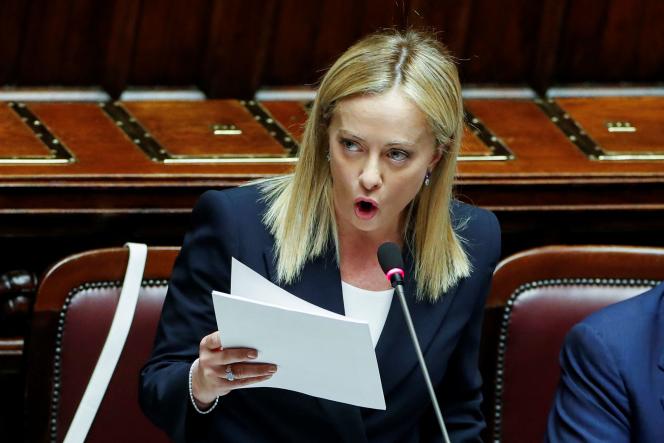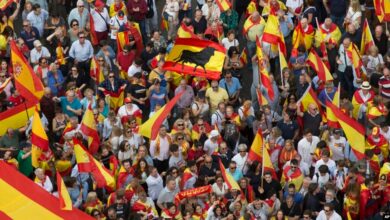
After she was elected as PM of Italy, Giorgia Meloni tried to appease the tension with “Brussels’ bureaucrats,” as she once called them during a rally of Vox supporters in Marbella, Spain, by advocating pro-Ukraine policy, but in her economic diplomacy, she looked beyond Europe while staying in Europe
Giorgia Meloni, Italy’s current PM and leader of Fratelli d’Italia, never missed a chance during her electoral campaign to criticize the European Union (EU). She managed, through this explicit anti-European establishment rhetoric, to win the hearts of her fans by implying more nationalism as an alternative to Globalization and planning another form of right-wing transnationalism instead.
After she was elected as PM of Italy, Meloni acted out of awareness that she had taken things too far, during the electoral campaign, in her criticism of the Western elites whose money she needs to carry out her agendas, and therefore, she tried to appease the tension with “Brussels’ bureaucrats,” as she once called them during a rally of Vox supporters in Marbella, Spain, by advocating pro-Ukraine policy.
This search for balance between attacking the Western establishment and joining it can be understood through her comment that Italy is more interested in seeking its national interests than receiving pats on the shoulder from EU leaders.
In her economic diplomacy, however, Meloni looked beyond Europe while staying in Europe. Interest for the new Italian ruling coalition lies outside of Europe- in the Mediterranean and elsewhere. Meloni’s “Mattei Plan,” which is aimed at reinforcing inter-Mediterranean trade and cooperation, as she describes it, is a sign of this search for new routes towards markets outside of the old exhausted continent.
Meloni has often juxtaposed this plan with Western, particularly, French economic policy in Africa, which she once blamed for slowing development in the continent. For her, this plan, unlike French colonialism, establishes win-win partnerships between Italy and Africa.
Mattei Plan was evoked by Italy’s strongest woman in her trips to Libya, Algeria, and India as part of a new vision of Italy’s foreign policy and cooperation in the Mediterranean. These trips stand witness to Italy’s changing foreign policy, one that breaks with Trans-Atlantic globalization and embraces a more pragmatic one.
These trips indicate that the world outside Europe is tempting for the Italians. India’s AI and digital potentials besides Algeria’s gas have lured the Italians even before the new coalition arrived to power.
In Algeria, Meloni signed landmark energy agreements that secured for Italy enough gas supply to contain the impact of the energy crisis. In the United Arab Emirates (UAE), Italy’s gas and oil giant ENI signed energy transition agreements.
Italy has been very European under the leadership of Giorgia Meloni who knows her country is need for European money from the COVID Recovery Fund to address the post-Covid hardships. Italy’s Mediterranean, African, and Indo-Pacific aspirations have not yet put it at odds with its worried European partners- except with France.
France and Italy’s competition in Africa and the Mediterranean goes back to the last 2 centuries. The Macro-Meloni rivalry goes back to many years ago when the outspoken opposition leader Meloni used France’s Liberal and European commitments to paint Italy as its victim.
A sign of this rivalry emerged when Meloni was excluded from a dinner of EU leaders with Ukraine’s Volodymyr Zelensky in Paris. But besides verbal skirmishes, there has been nothing to mar Italy’s relations with its European partners.
Just as it could be part of a discourse intended to lure her electors, Meloni’s unease with the EU as it is run today could be the real motivation- the driving force- underlying her foreign policy. Until she manages to contain internal political strife, gains a strong foothold into African and Asian markets, and makes reliable allies, she may avoid translating this unease into explicit policy.
This policy may not necessarily be synonymous Italexit nor can one be sure it will be anti-Euopean. It may just be one that advocates a right-wing Europe whose features are starting to emerge out of the shadow of Neoliberal Europe. These traits include stronger borders and the emerging European Conservatives and Reformists Group in the European Parliament, which comprises Spain’s VOX, Meloni’s Fratelli D’Italia, and Sweden Democrats; and of which Meloi is a leader.
This possible new Europe can also be seen in light of the comparison drawn by many between Meloni and Angela Merkel. Besides the Mediterranean, Italy and Europe’s strong lady may have a plan for Europe where she acts like a new Merkel with a different agenda that pushes for stronger borders, less free-market, more protectionism, and less integration but cooperation with the rest of the world.




